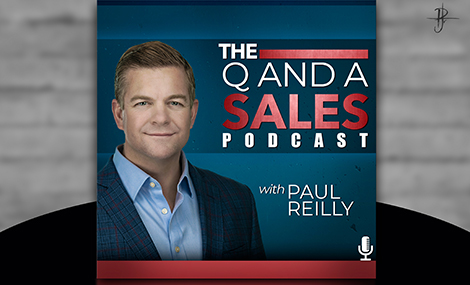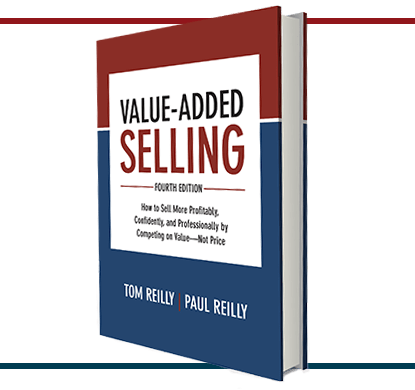Paul focuses on building strong customer relationships. Those relationships matter.
Show Notes
In two separate buyer surveys, “relationship with the salesperson” ranked higher (more important) than price.
Expand your footprint and meet multiple decision makers. The more people you meet with, the more protected the opportunity will be.
You are in the “hero” business. Make your customer look like a hero to their company, to their customers.
Ask tinkering questions. These questions will generate discussion on how you can get better for your customer.
Did you enjoy the podcast? Go to Apple Podcasts to rate/review the podcast: https://podcasts.apple.com/us/podcast/the-q-and-a-sales-podcast/id1485103513. Click “Listen” then the “ratings and reviews” button.
Visit www.ToughTimer.com to get started on the 30-Day Tough-Timer Challenge!
Order your copy of Selling Through Tough Times from Amazon or Barnes & Noble!
Click here to purchase the latest edition of Value-Added Selling!
Interested in our public seminar offerings? Click here to learn more.
***
Thank you for tuning in. Our show is updated weekly with the questions you ask. So, please go to the home page to ask the question that you want answered.
Thank you to our production team at The Creative Impostor Studios.
Be sure to follow our show in your favorite podcast app and share this episode with a colleague or friend.
And most importantly…make it a big day.
How important are customer relationships?
(Transcribed from podcast)
So, I’m going to begin with a question like always, and the question is, “How strong are your customer relationships?” And, and I’ll tell you what prompted this question. I was working with a sales team recently, and something frustrating happened to one particular salesperson. He found out, actually, that his customer decided to buy from the competition, but that customer didn’t even bother telling the salesperson. So the customer didn’t even give that salesperson a heads up that they were going to switch and go to the competition. And when I hear that, I can’t help but think, “Okay, wow. This salesperson didn’t even have a solid enough relationship with one of their top customers so that they would break up with that salesperson face-to-face.” That’s the equivalent of starting to date someone new when you haven’t broken up with your old girlfriend or boyfriend.
And so, how strong are your relationships with your customers? Is your relationship strong enough where they’re at least willing to break up with you face to face? If not, we need to rethink how we’re building relationships. So we’re going to focus on customer relationship building in today’s episode.
Before we get into that, you hear everywhere there are rumblings of a recession this year. It’s going to be Q3/Q4 of 2023, extending into 2024. Well, we know that during a downturn, relationships matter. Your customers are going to experience tough times, and they’re going to remember not only what you do for them in those tough times, but also how you made them feel. And if you make them feel like a priority, if you continue to build that relationship, that’s going to continue to pay dividends. So, if you want to learn more on how to do that, pick up your copy of Selling Through Tough Times. Selling Through Tough Times is available wherever you get your books. Check it out. We have an entire chapter dedicated to partnering, which is where you’re going to find most of the content.
With that being said, let’s get back to it. How important are customer relationships? Well, I’ll share a few data points to get started. Our research on top-achieving salespeople shows that relationships matter, not only to you as salespeople, but also to the customer. In fact, 79% of the success that top achievers achieve is due to the relationships that they build. And we uncovered that by asking top achievers, we asked them, “How much of your success is attributed to customer relationships?” and the average was 79%—a significant amount.
Now, not only that, we asked a group of buyers in our most recent buyers survey about relationships and other factors. And we asked, “Why would you be willing to partner with one company over another?” And we asked this on two separate occasions, and in both cases, relationship with the salesperson ranked higher, meaning more important, than price. Relationships matter. Don’t let anyone tell you that they do not. Our research continues to show that they do.
So I’m going to share a few ideas on how you can build stronger relationships. Number one, fully immerse yourself in your customer’s business. And that means expanding your footprint, getting to meet with all sorts of decision makers. You know, I remember one salesperson in our training seminar, he was a top achiever within this organization, and we were talking about the number of sales calls that salespeople should make per day, per week, so on and so forth. And we started talking about the quality of the sales call as well. And he said, “You know, there may be days where I only make one or two sales calls.” But he said, “When I go to one of my top customers, I’m not only talking to my main contact, I’m talking to the engineering people, the operations people. I’m talking to accounts receivable. I’m talking to their maintenance crew as well.” He said that in one sales call last week, he met with 10 people—10 different people—at one location.
Now this is a top achiever who has expanded the footprint and has built up what we call internal champions. He’s talking to anyone and everyone that is part of the buying process, and he wants to know how their experience has been. He wants to know how we can create more value. So he’s meeting with these individuals. Now this is an important point because he is well protected within this opportunity. And here’s what I mean by that. He has 10 people that he is meeting with that he has built a relationship with. If one person was fired or left or went to another company, whatever may have happened, he still has nine other people he can reach out to. That is the type of webbing you want to build between you and your customer. You want to have multiple points of contact. The more people you’re meeting with, the more protected this opportunity will be. So keep that in mind. Expand your footprint and try to get at least six relationships built within your top opportunity.
Next thing you want to do—. You are in the hero business. Keep that in mind. Make your customer a hero. Make your contacts look like a hero, either to their boss, to the team that they’re managing. Make your customer look like a hero to their customer. The more you make others look like a hero, the more they’re going to make you look like a hero to your own company.
So when you are meeting with these customers, when you’re meeting with multiple points of contact within an opportunity, just ask yourself, “Okay, what can I do to make this person look like a hero today?” You are in the hero-making business, and by doing that, guys, they’re going to make you look like a hero as well. So remember that question: “How can I make them look like a hero?”
Next thought, when you’re in there meeting with your main contacts, we need to look for opportunities to create more value for these individuals. And here’s what will often happen. As a salesperson, you continuously meet with the same people, talk about the same things, recommend the same products, talk about the same applications. Everything starts to feel like the same. It’s almost like Groundhog Day. Well, opportunities to create value tend to hide in plain sight. So, when you are out there meeting with your customers, you need to ask what we call “tinkering” questions. Tinkering questions are questions that generate a discussion around how you can improve and get better for that customer.
And these questions can be simple like, “How can we make your life easier?” Another question could be, “Mr. Customer, what do you dislike doing that we can do for you?” Another question—just to generate some ideas, some thoughts—say, “Okay, if we were to start over from scratch right now, what does the ideal solution look like?” Or “What’s missing from our current solution?” These questions generate a better discussion around creating value because, you have to remember, your competition is eagerly knocking on the door trying to steal that business from you. And if you’re able to proactively create more value, that’s like building a wall to keep the competition out. So look for those opportunities to create more value.
Next idea: reinforce the value that you’ve already delivered. Make the customer aware of all those great things that you do for them and the impact that it’s had on their business. And sometimes we need to be subtle when we do this, with simple thank you notes reminding them of some of your value added extras, maybe a thorough business review. Other times we need to use a sledgehammer where we have to go back and say, “Hey, here’s what we’ve been doing for you lately.” And we need to make our customers aware of that because our customers tend to forget about all the value that we deliver. Value reminding can help strengthen the bond between you and the customer.
And you know what, the final thought here as we wrap things up. You know, I’ve shared a lot of ideas and the effort that goes into this is substantial. It requires a significant amount of time, energy, and effort on your part to make all of this happen. You got to, number one—expand your footprint and fully immerse yourself in the customer’s business. You have to look for opportunities to make your contacts look like a hero. You’re looking for ways to create more value. And then you’re reminding the customer of all that value. This takes time, energy, and effort. So, from the very beginning, before you initiate a campaign like this, make sure that the opportunity is worth it.
You know, that’s one of the fundamental principles within Value-Added Selling is that every customer is not the same. There are some customers who are more important to your business. Yes, every customer deserves our respect and all that, but not every customer is a value-added customer—a high-value target. So before you initiate a campaign where you’re going to build that relationship, make sure that it is worth it. That the opportunity is there.
One other thing while we’re getting into it—use entertainment. Entertainment is such an important element in relationship building, and I know many corporations out there have policies and procedures and all that in place, but relationship building and entertainment go hand in hand. And so, I would encourage you to is to invest in that. Invest in events; invest in taking your customers out to dinners, lunches, doing all that good stuff. Yeah, follow the corporate policy, but be willing to challenge it a little bit as well. Go back to your boss and say, “Hey, look, entertainment is how I build relationships.” Do what you need to do. Make it happen. Get out there and build those relationships.
All right, folks. Well, that is the episode for today. Again, relationships are critical. Get to work on building those stronger bonds with your customer.
Make it a big day.


